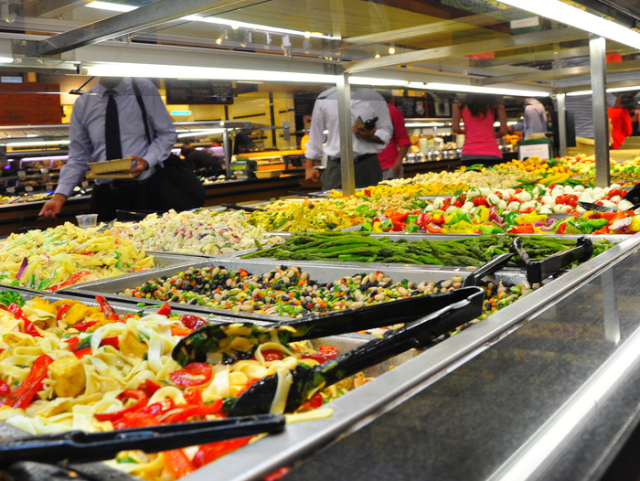There’s a potential downside to major food price cuts that most economists have not said much about – yet. But there’s one food industry observer who’s not afraid to spotlight the issue. His message? Be careful what you wish for!
 Specialty departments may disappear from supermarkets if food
Specialty departments may disappear from supermarkets if food
retailers are forced to reduce prices by 15 to 20 percent…
A voice in the wilderness?
Canada’s Food Guy, Dr. Sylvain Charlebois, Director of the Agri-Food Analysis Lab (AFAL) at Dalhousie Uni-versity, is celebrating the recent stabilization of food prices along with the rest of us. But he’s also warning that a major reduction would be potentially disastrous for the food industry and, by asso-ciation, for consumers.
His comments come as food price inflation nears zero in Canada, and has fallen to low single digits in most developed countries. At the same time, though, grassroots agitators are calling for supermarket chains to dig into their record profits and cut prices by 15 to 20 percent. And one online group is even calling on consumers to ‘steal from Loblaw’s’ in protest over high food prices.
Most of us also welcome major food price reductions. But with them, Charlebois cautions, would come major consequences.
Global influences
Charlebois notes, as have many other food economists, that global conditions are largely to blame for the skyrocketing food prices over the past 5 years or so. Transportation issues, increases in fertilizer and other farm gate costs, energy supply upheaval, and social and political unrest in many corners of the globe have combined to make the entire world economy volatile.
High food prices are just the most visible of the consequences of this situation – to the average consumer.
The outlook
The outlook on food prices in Canada remains optimistic. “By the end of the year, deflationary pressures may become evident in grocery stores, potentially resulting in the average food basket costing less compared to last year,” Charlebois predicts, in a new Writer’s Bloc essay. “Such trends are not un-precedented in Canada, which experienced a negative food inflation rate from October 2016 to May 2017, and briefly in 1992.”
Effects on providers
But any sharp reduction in food prices may trigger a dramatic reaction among supermarket proprietors.
Charlebois says, if retail food prices are to continue falling, the big supermarket chains will first increase pressure on their supplies and manufacturers, to cut their prices, protecting retail profit margins.
But if prices were forced significantly lower – for example, by the 15 to 20 percent being called for by consumer groups – growers, manufacturers and supermarkets would have to take drastic action.
A matter of ebb and flow…
“Deflationary cycles may compel companies to divest, curb their innovative ambitions, and focus solely on operational essentials,” Charlebois explains. “Growth aspirations, which help the sector expand, allow consumers access to new products and enhanced quality.”
Manufacturers might cut back on the variety and volume of products they make, as they did during the COVID crisis. They might close plants, putting people out of work. Supermarkets might close ‘less profitable’ locations, and cut specialty departments.
Overall, the industry could be expected to cut forward-looking, innovative programs beneficial to consumers, in efforts to protect their bottom line. And protect it they will, since all major publicly traded corporations are ultimately at the mercy of their shareholders. Who expect significant returns on their investments no matter the external conditions.
The bottom line…
Charlebois’s message can be boiled down to one old, familiar maxim: “Be careful what you wish for!”
I want food prices to drop significantly as much as anyone. But I also have to agree with Charlebois that the drawbacks might be worse than the high prices, in the long run.
Meanwhile… We on the receiving end of the food chain remain at the mercy of general economic instability and self-serving industry policies.
~ Maggie J.

